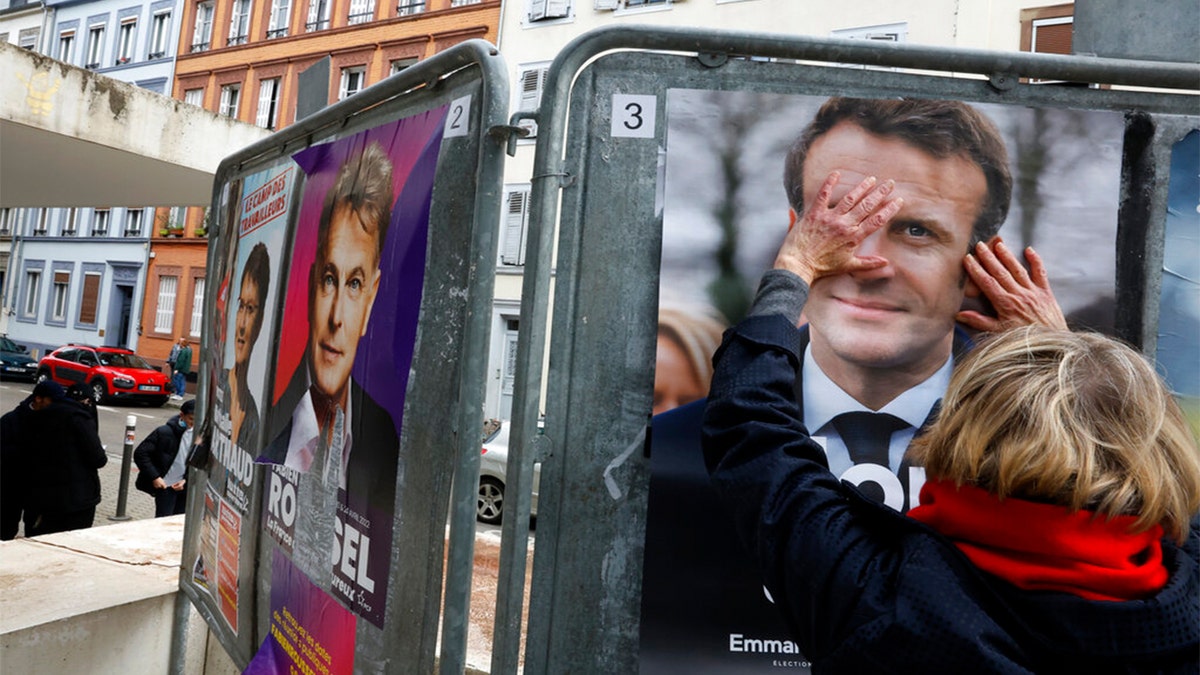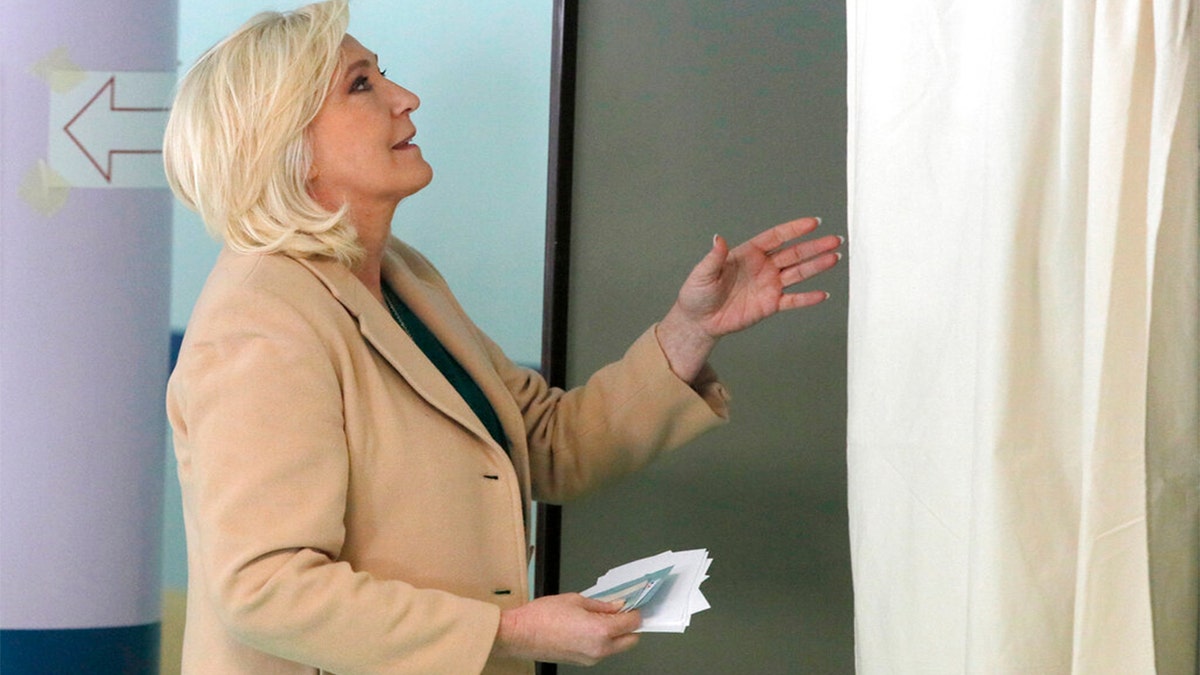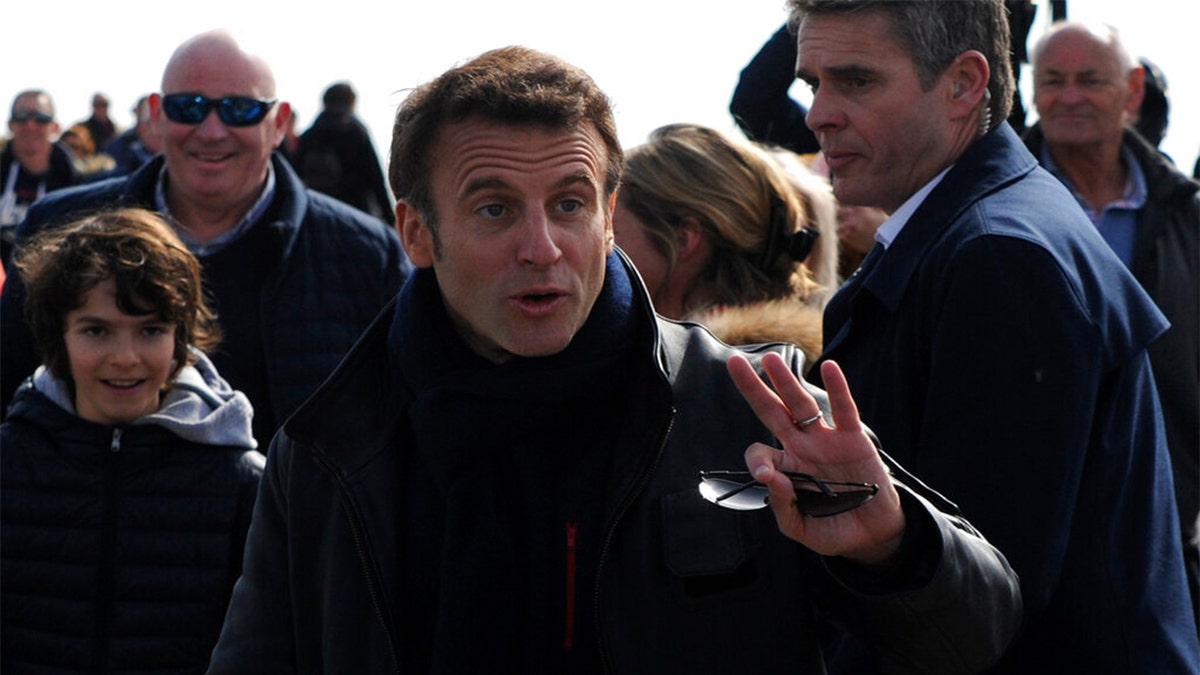What is France's role in the Russia-Ukraine war?
French ambassador to the U.S. Philippe Etienne weighs in on France and the EU's responses to Russia's war on Ukraine on 'Special Report.'
Projections for France's presidential election on Sunday showed President Emmanuel Macron and his leading rival Marine Le Pen as the leading candidates in the first round before qualifying for a second round later this month.
If borne out by official results, the election would see the same pairing of candidates as in 2017, when Macron trounced Le Pen by a landslide to become France's youngest president in modern history.
This time around, however, the results are expected to be much tighter.

A woman touches the presidential campaign poster of French president Emmanuel Macron during the first round of the French presidential election, in Strasbourg, eastern France Sunday, April 10, 2022. (AP Photo/Jean-Francois Badias)
The projections show Macron with a comfortable first-round lead Sunday of between 27%-to-29% support, ahead of Le Pen, who is expected to capture 23%-to-24% of the vote. But that gap could narrow as the country gets closer to the April 24 runoff election.
Macron, who is asking France's 48 million voters for a second five-year term, has portrayed himself as a centrist, seeking to modernize the economy and strengthen European cooperation against the nationalist Le Pen. But he was up against 11 other candidates and widespread voter anger and apathy.
Le Pen, meanwhile, has tapped into the foremost issue on many voters' minds: living costs that have soared amid the disruptions of war in Ukraine and the economic repercussions of western sanctions on Russia.
A Macron victory would be seen as a defeat for European populists. It might also not be cheered in the Kremlin: Macron has strongly backed European Union sanctions on Russia, while Le Pen has worried publicly about their impact on French living standards.
FRANCE'S MACRON WARNS AGAINST ESCALATION AFTER BIDEN SAYS PUTIN ‘CANNOT REMAIN IN POWER’
Among the 27 EU members, France is the only one that has a nuclear arsenal and a U.N. Security Council veto. It has been instrumental in shaping Europe's response to Russian's military assault on Ukraine. Macron is the only leading French presidential candidate who fully supports the NATO military alliance.
Still, his popularity has been hampered by his handling of the COVID-19 pandemic and his Ukrainian diplomacy. A reform-minded technocrat, he's been dogged by the "aloof" label for years.
The top two vote-getters in Sunday's election advance to a decisive runoff on April 24 — unless one candidate gets more than half of the nationwide vote Sunday, which has never happened before in France.

French far-right leader Marine Le Pen arrives to vote in the first round of the presidential election at a polling station Sunday, April 10, 2022 in Henin-Beaumont, northern France. (AP Photo/Michel Spingler)
For months, Macron looked like he would become France's first president in 20 years to win a second term. But National Rally leader Le Pen ate into his polling lead in the campaign's closing stages, as the pain of rising gas, food, and energy prices became a dominant election theme for many low-income households.
But pollsters suggest that just a few percentage points could separate Macron and Le Pen on Sunday. If that scenario emerges from the first-round ballot, the runoff campaign is likely to be far more confrontational than it was during round one, which was largely overshadowed by Ukraine.

French President and centrist presidential candidate for reelection Emmanuel Macron gestures as he strolls after voting for the first round of the presidential election, Sunday, April 10, 2022 in Le Touquet, northern France. (AP Photo/Louis Witter)
Le Pen has taken a hardline stance on immigration, vowing to ban Muslim headscarves in French streets and halal and kosher butchers, and drastically reduce immigration from outside Europe. But she has gone at lengths in recent years to soften her image – an effort that has won over some voters but made others even more suspicious.
A win for Macron will signal a victory for the EU, which has shown a rare show of unity in its response to Ukraine. Observers say a Macron reelection would spell increased cooperation and investment in European security and defense — especially with a new pro-EU German government.
Le Pen, meanwhile, has long been a critic of Brussels and would align with other far-right leaders in Europe, like Hungary's Viktor Orban.
CLICK HERE TO GET THE FOX NEWS APP
Russia's war in Ukraine has afforded Macron the chance to demonstrate his influence on the international stage and burnish his pro-NATO credentials. Other presidential candidates hold differing views on France's role within the military alliance.
The Associated Press and Fox News' Greg Palkot contributed to this report.









































